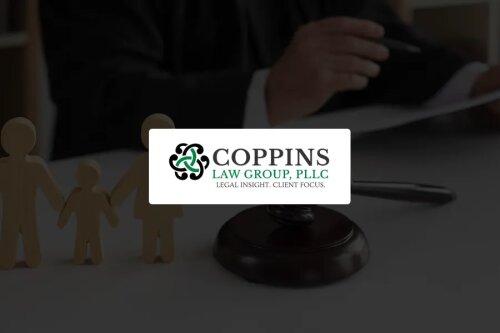Best Family Lawyers in New York City
Share your needs with us, get contacted by law firms.
Free. Takes 2 min.
Free Guide to Hiring a Family Lawyer
List of the best lawyers in New York City, United States
United States Family Legal Questions answered by Lawyers
Browse our 2 legal questions about Family in United States and read the lawyer answers, or ask your own questions for free.
- Confirming the authenticity of a divorce decree
- I'm married to a Nigerian, and I believe he provided a fake divorce decree, I need help to confirm this decree.
-
Lawyer answer by Nomos Legal Practice
Thank you and best regards, Kingsley Izimah, Esq. SK Solicitors
Read full answer - Child support laws
- If my annual salary is 4 million pesos my wife's salary is 240,000 pesos, and she lives in Rizal, how much will I pay in child support for one child?
-
Lawyer answer by Rana Fazal Muhammad Law Associates
it is the discretionary power of the court to determine the amount for the support of your child, it is not fixed amount
Read full answer
United States Family Legal Articles
Browse our 4 legal articles about Family in United States written by expert lawyers.
- Fighting Custody in Texas: US 2026 Rules for Non-Parents
- Texas has tightened "standing" rules for non-parents in child custody cases: many step-parents and grandparents who used to qualify can no longer file custody suits. Non-parents must now often show they had exclusive care and control of the child for a period of time, not just that they helped raise... Read more →
- Texas Child Support Cap 2026 - Calc Rules
- Texas raises the child support "net resources" cap from about $9,200 to about $11,700 per month starting September 1, 2025, which significantly increases guideline support for higher income parents. For 1 child, the guideline maximum jumps from about $1,840 to around $2,340 per month; for 2 children, from about $2,300... Read more →
- Divorce and Crypto in the United States 2026: Valuing Assets
- Family Law in the United States: Divorce, Crypto, and Complex Assets Family law in the United States is mostly state-specific, but federal tax rules (IRS) heavily affect how you divide assets like crypto, stock, and retirement accounts. Crypto acquired during the marriage is usually marital property, subject to division like... Read more →
About Family Law in New York City, United States
Family law in New York City covers divorce, child custody and visitation, child support, spousal support, adoption, and protections against domestic violence. The state court system governs these matters, with Supreme Court handling most divorce and property division, and Family Court handling custody, support, protective orders, and juvenile issues. In NYC, residents often navigate both courts depending on the relief sought and the stage of the case.
New York uses attorney engagement to handle family matters, and court procedures combine statutory rules with local practices. The typical path may involve temporary orders, mediation, and post judgement modifications. Understanding the distinction between court jurisdictions helps you prepare appropriate filings and avoid delays.
Two core legal concepts in this area are no fault divorce and child support guidelines. No fault divorce allows dissolution without proving fault, while child support guidelines provide a structured framework for determining parental obligations. These principles shape nearly every family case you might encounter in New York City.
Why You May Need a Lawyer
Contested divorce with complex assets or business interests in NYC often requires an attorney to value and divide assets fairly. Complex valuations, tax consequences, and alimony considerations are best navigated with professional counsel. An attorney can coordinate with forensic accountants and help protect your financial interests in Supreme Court.
Child custody and relocation disputes between Bronx, Brooklyn, Manhattan, Queens, and Staten Island residents frequently involve best interests of the child and relocation standards. An attorney can present evidence on stability, caregiving, and the feasibility of a move to a different school district or state. A lawyer also helps you manage cross borough filings efficiently.
Modifying a child support order after a major change in income or employment requires precise calculations and proper filings. An attorney can guide you through the Child Support Standards Act calculations and ensure deviations or enforceable terms are properly obtained. This work often involves coordination between Family Court and Supreme Court procedures.
Protective orders or protective orders defense are common in NYC due to domestic violence concerns. An attorney helps you pursue safe, enforceable orders and navigate emergency or temporary protections. They can also advise on safety planning and coordinating with authorities and support services.
Adoption and guardianship matters, including step-parent adoption or specialized guardianships for a relative, require meticulous paperwork and state approvals. An attorney can manage petitions, home studies where required, and consents from other parties. You’ll benefi t from counsel on the timeline and potential stipulations involved.
Prenuptial agreements and postnuptial agreements require careful drafting and review. An attorney can help you craft provisions that address property, income, and future support, and can also negotiate terms with the other party. If disputes arise, counsel is essential to enforce or modify terms in court.
Local Laws Overview
Key statutes govern family law matters in New York City. The Domestic Relations Law and the Family Court Act provide the framework for divorce, custody, support, and protective orders across the five boroughs. These laws guide procedures in both Supreme Court and Family Court.
Domestic Relations Law - No-Fault Divorce (DRL § 170)
No-Fault Divorce, codified in Domestic Relations Law, allows dissolution without proving fault. This approach reduces disputes over fault and emphasizes irretrievable breakdown as the basis for divorce. In NYC, most divorce actions proceed in the Supreme Court with related custody and support issues addressed in the same or related proceedings.
Domestic Relations Law - Child Support Standards Act (CSSA, DRL § 240)
The Child Support Standards Act establishes the guidelines used to calculate child support obligations. The act uses a formula based on combined parental income and the number of children, with allowances for special needs and shared custody when applicable. Deviations from the guidelines must be justified by the court.
Family Court Act (FCA)
The Family Court Act governs proceedings in Family Court, including custody and visitation, support, orders of protection, and guardianship. This Act enables temporary relief, safety orders, and long-term arrangements for families, particularly when children are involved. Family Court cases often coordinate with Supreme Court matters when overlapping issues arise.
Source: New York State Unified Court System - Family Court handles custody, support, and protective orders; Supreme Court handles divorce and related issues.
For official text and procedural guidance, you can review these resources: - New York Courts: official court information and case management resources (nycourts.gov) - New York State Child Support Program: guidelines, enforcement, and support orders (childsupport.ny.gov) - Office for the Prevention of Domestic Violence: safety planning and protective order information (opdv.ny.gov)
Frequently Asked Questions
What is the difference between custody and visitation in NY Family Court?
Custody determines who makes major decisions and where a child primarily lives. Visitation refers to the non custodial parent's time with the child. Courts consider the child welfare and stability when awarding both.
How do I file for divorce in New York City?
Divorce filings are typically filed in the Supreme Court. You may begin with a summons and complaint and then pursue a separation or no fault divorce depending on your situation. You will likely need to attend a preliminary conference.
What is the Child Support Standards Act and how does it apply in NYC?
The CSSA provides formulas to calculate child support based on both parents income and the number of children. Courts may deviate only for specific reasons, such as extraordinary medical costs.
How long do custody and support hearings typically take in NYC?
Timeline varies by caseload and complexity. Uncontested matters can resolve in weeks, while contested cases may stretch over several months to years. Virtual and in person hearings can influence scheduling speed.
Do I need an attorney to file for a protective order in NYC?
While you can file without an attorney, having counsel improves the accuracy of filings and the clarity of safety orders. An attorney helps you navigate temporary and final protective orders and safety planning.
Should I get a prenuptial agreement reviewed by a lawyer in NYC?
Yes. A properly drafted prenuptial agreement can reduce disputes later and clarify asset division. An attorney can ensure enforceability and address New York state requirements.
Is relocation of a child allowed in NYC and how do I request it?
Relocation requests require court approval to change the child’s primary residence. You must show that the move serves the child's best interests and may involve evidence about family support and schooling.
How much does a NYC family law attorney typically cost for a consult?
Consultation fees vary by attorney and case type. Some practitioners offer free initial consultations, while others bill hourly. Be sure to ask about fee structure before engagement.
What documents should I bring to a Family Court hearing in NYC?
Bring identification, the petition or complaint, any temporary orders, financial documents, tax returns, and proof of income. If relevant, include custody plans, school records, and medical information for the child.
Do I qualify for a no-fault divorce in New York and what is irretrievable breakdown?
Most couples qualify for no-fault divorce when the relationship has irretrievably broken down for at least six months. There is no need to prove fault in such cases. The court requires appropriate documentation and residency basics.
Can grandparents obtain visitation rights in NYC and how?
Grandparents may seek visitation under certain circumstances if it serves the child’s best interests. The court weighs factors like existing parental rights and the quality of the grandparent relationship.
What are the steps to modify a child support order in NYC?
File a petition for modification with the appropriate court when there is a substantial change in circumstances. You must provide updated income information and relevant financial changes since the last order.
Additional Resources
- New York State Unified Court System - Official information on court locations, forms, and procedures for Family Court and Supreme Court matters (nycourts.gov).
- Office for the Prevention of Domestic Violence (OPDV) - Resources on protective orders, safety planning, and DV services (opdv.ny.gov).
- New York State Child Support Program - Guidelines, enforcement, and information on establishing or modifying child support (childsupport.ny.gov).
Next Steps
- Clarify your goals and collect key documents. Define whether your first need is a divorce, custody order, or support modification. Gather income statements, tax returns, asset records, and any existing court orders. Timeline: 1-2 weeks.
- Identify potential attorneys and request initial consultations. Prepare questions about fees, experience with NYC courts, and strategy. Timeline: 1-3 weeks.
- Schedule consultations and compare approaches. Bring a summary of your case and your goals. Ask about anticipated timelines, required documents, and likely costs. Timeline: 2-4 weeks.
- Choose an attorney and sign a retainer agreement. Confirm fee structure, anticipated case plan, and communication expectations. Timeline: 1-3 weeks after consultations.
- File the necessary petitions or motions with the appropriate court. Your attorney will guide you through forms, service, and deadlines. Timeline: 2-6 weeks depending on court schedules.
- Prepare for and attend hearings with your attorney. Provide all requested documentation and follow court orders. Timeline varies by case complexity and court calendars.
Lawzana helps you find the best lawyers and law firms in New York City through a curated and pre-screened list of qualified legal professionals. Our platform offers rankings and detailed profiles of attorneys and law firms, allowing you to compare based on practice areas, including Family, experience, and client feedback.
Each profile includes a description of the firm's areas of practice, client reviews, team members and partners, year of establishment, spoken languages, office locations, contact information, social media presence, and any published articles or resources. Most firms on our platform speak English and are experienced in both local and international legal matters.
Get a quote from top-rated law firms in New York City, United States — quickly, securely, and without unnecessary hassle.
Disclaimer:
The information provided on this page is for general informational purposes only and does not constitute legal advice. While we strive to ensure the accuracy and relevance of the content, legal information may change over time, and interpretations of the law can vary. You should always consult with a qualified legal professional for advice specific to your situation.
We disclaim all liability for actions taken or not taken based on the content of this page. If you believe any information is incorrect or outdated, please contact us, and we will review and update it where appropriate.
Browse family law firms by service in New York City, United States
New York City, United States Attorneys in related practice areas.
















